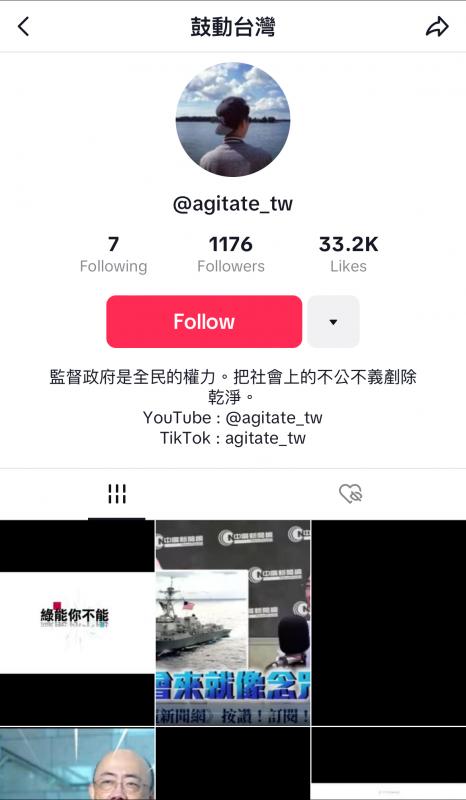Coordinated actors have been working to influence Taiwanese politics by manipulating online conversation since at least May last year, a US-based network analysis firm found in a report published on Wednesday.
Graphika, which uses artificial intelligence to analyze social media landscapes, said it has identified a “sustained and coordinated effort” to mold political conversation online ahead of next month’s elections.
Its study identified more than 800 Facebook profiles, 13 Facebook pages, one TikTok account and one YouTube channel centered around the persona “Agitate Taiwan” (鼓動台灣).

Photo: Screengrab from TikTok
Videos posted daily by Agitate Taiwan on YouTube and TikTok were distributed through likely inauthentic Facebook accounts, it said, adding that the content had mostly been taken down by the platforms.
Graphika said it found signs of coordination, such as different accounts posting the same content within minutes of each other and using the same sets of hashtags.
The content tended to support the Chinese Nationalist Party (KMT) while disparaging other parties and candidates, including Taiwan People’s Party Chairman Ko Wen-je (柯文哲) and Hon Hai Precision Industry Co founder Terry Gou (郭台銘), Graphika said.
They also tended to quickly leverage domestic news “to portray the KMT’s opponents as incompetent and corrupt,” it said, citing the egg import controversy and alleged drugging of kindergarteners as examples.
The firm was unable to determine whether Agitate Taiwan was part of the operation, or an authentic account leveraged by the actors.
Although it could not link the activity to any specific actor, Graphika did find some erroneous transliterations of Hoklo (commonly known as Taiwanese) slang, “calling into question the operators’ Taiwanese language fluency.”
The firm predicted that influence operations would continue to increase ahead of the election on Jan. 13, adding that it had previously seen actors linked to China “repeatedly target” Taiwanese audiences.

Taiwan is to commence mass production of the Tien Kung (天弓, “Sky Bow”) III, IV and V missiles by the second quarter of this year if the legislature approves the government’s NT$1.25 trillion (US$39.78 billion) special defense budget, an official said yesterday. Commenting on condition of anonymity, a defense official with knowledge of the matter said that the advanced systems are expected to provide crucial capabilities against ballistic and cruise missiles for the proposed “T-Dome,” an advanced, multi-layered air defense network. The Tien Kung III is an air defense missile with a maximum interception altitude of 35km. The Tien Kung IV and V

The disruption of 941 flights in and out of Taiwan due to China’s large-scale military exercises was no accident, but rather the result of a “quasi-blockade” used to simulate creating the air and sea routes needed for an amphibious landing, a military expert said. The disruptions occurred on Tuesday and lasted about 10 hours as China conducted live-fire drills in the Taiwan Strait. The Civil Aviation Administration (CAA) said the exercises affected 857 international flights and 84 domestic flights, affecting more than 100,000 travelers. Su Tzu-yun (蘇紫雲), a research fellow at the government-sponsored Institute for National Defense and Security Research, said the air

Taiwan lacks effective and cost-efficient armaments to intercept rockets, making the planned “T-Dome” interception system necessary, two experts said on Tuesday. The concerns were raised after China’s military fired two waves of rockets during live-fire drills around Taiwan on Tuesday, part of two-day exercises code-named “Justice Mission 2025.” The first wave involved 17 rockets launched at 9am from Pingtan in China’s Fujian Province, according to Lieutenant General Hsieh Jih-sheng (謝日升) of the Office of the Deputy Chief of the General Staff for Intelligence at the Ministry of National Defense. Those rockets landed 70 nautical miles (129.6km) northeast of Keelung without flying over Taiwan,

A strong continental cold air mass is to bring pollutants to Taiwan from tomorrow, the Ministry of Environment said today, as it issued an “orange” air quality alert for most of the country. All of Taiwan except for Hualien and Taitung counties is to be under an “orange” air quality alert tomorrow, indicating air quality that is unhealthy for sensitive groups. In China, areas from Shandong to Shanghai have been enveloped in haze since Saturday, the ministry said in a news release. Yesterday, hourly concentrations of PM2.5 in these areas ranged from 65 to 160 micrograms per cubic meter (mg/m³), and pollutants were